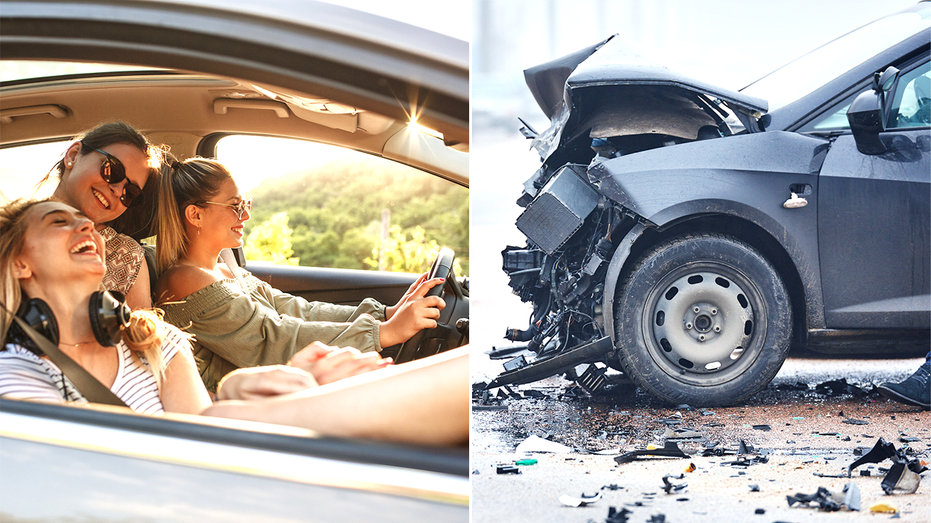
[Fox News] Ahead of the ‘100 deadliest days of summer,’ here’s what teen drivers must know
America’s roads are about to get a little more dangerous as summer approaches.
Experts dub the period between Memorial Day and Labor Day as the “100 deadliest days of summer” due to a consecutive spike in teen-related driving incidents.
The summer months see an increase of more than 20% in teen traffic fatalities, according to the National Road Safety Foundation (NRSF), based in New York.
DRIVING DANGERS: 9 TOP DISTRACTIONS THAT CONTRIBUTE TO ACCIDENTS, ACCORDING TO EXPERTS
Every year, 2,100 teens on average are involved in fatal crashes, the foundation said in a press release, with 30% — or seven deaths per day — happening in that 100-day period.
To raise awareness, NRSF has partnered with youth groups such as Students Against Destructive Decisions (SADD) in an attempt to make this summer safer.
In an interview with Fox News Digital, SADD executive director Scott Meyers said summer is the “deadliest time of year” for teen drivers who are out of school and on the road traveling to work, vacations or activities with friends.
“Basically, they’re on the road more,” Missouri-based Meyers said. “And statistics will show that … teen drivers are distracted by everything.”
Common distractions can include passengers, signs on the roadside and cellphones, among others, he said.
TEEN IS HASSLED BY FRIENDS WHEN HE WON’T DRIVE UNLESS ALL PASSENGERS ARE BUCKLED UP
There are also more pedestrians walking and biking during the summer, Meyers said — a factor that statistically leads to more incidents.
Increasing the danger is the fact that more than 50% of teen drivers involved in crashes were not wearing seat belts, according to Meyers.
AAA National Office driving expert Bill Van Tassel also discussed the “100 deadliest days” in a separate interview with Fox News Digital, saying there are “a lot of changes” for teen drivers once summer arrives.
“A lot of the environment in which they’re driving changes,” said Van Tassel, based in Longwood, Florida. “Part of that involves a higher risk behind the wheel.”
“Overall, it’s important that we get the word out — not only to the teens themselves to help them understand that this is a risky time, but also to their parents, who ideally are quite involved in their teens’ driving.”
Based on AAA data, a total of 21,461 fatal crashes involving teens occurred in the U.S. between 2013 and 2022 — and 31% of them happened between Memorial Day and Labor Day.
SADD’s 2024 campaign, called “The Safest Summer Ever,” will feature student-led programming that teaches safe practices such as wearing seat belts and avoiding distractions, according to Samantha Talarico, the company’s Tennessee-based communications manager.
“We want to continue equipping these youth to have these conversations,” she told Fox News Digital. “Because just as easily as they can say, ‘Oh, that’s silly, we don’t need to do that,’ they can also turn around and say, ‘Hey, buckle up.’”
THESE MEDICATIONS COULD MAKE DRIVING DANGEROUS, THE FDA WARNS
As Meyers pointed out, the awareness campaigns encourage students to share these messages on social media and “positively impact” their peers through fun games and activities.
SADD works with its national and state-based Student Leadership Councils to determine the conversations needed around mental health, substance abuse, traffic safety and other initiatives involving teens, Talarico said.
Meyers and Talarico agreed that SADD’s student-led approach is key to resonating with teens, since they’re most aware of what will have an impact on their peers.
“[The students] tell us all the time, ‘We really don’t want people talking at us. We just want to talk to each other,’” Talarico said.
To reduce the risk of car accidents in the summer, Meyers encouraged teen drivers to “do everything they can” to stay safe, including observing the speed limit, wearing a seat belt and “not going beyond what you’re comfortable doing.”
5 THINGS YOU SHOULD NOT DO DURING A TRAFFIC STOP
“For teen drivers, it’s a newfound freedom, and it’s an opportunity to take risks,” he said. “Sometimes those risks go above and beyond our comfort level.”
Meyers advised, “If you’re not comfortable or if it doesn’t feel right, you probably need to stop … and pull over. You probably need to say no, whatever the situation is.”
Parents and guardians also have a responsibility to encourage their teenagers to check their comfort level behind the wheel and to make healthy decisions, Meyers added.
He said he hopes that’s “going to save their lives and other people’s lives.”
Americans sometimes take their “privilege to drive” for granted by ignoring the rules of the road, Van Tassel suggested.
CLICK HERE TO SIGN UP FOR OUR LIFESTYLE NEWSLETTER
“That privilege can be taken away from us, so we need to take it seriously,” he told Fox News Digital. “That means thinking about driving more than we usually do.”
Since driving as a daily task can sometimes become mindless, Van Tassel encouraged all drivers to be “100% aware” of what’s going on around them, since it’s “hard to avoid hitting something if you don’t see it.”
Distracted driving is “even trickier” with teens who feel constant social pressure to attend events and are more likely to reach for their cellphones while driving, Van Tassel warned.
“They might think, ‘I’m just going to look at the screen real quick or send a text,’” he said. “But it only takes half a second to miss something important [on the road] — and then you’re in big trouble.”
The driving expert encouraged parents and guardians to drive with their teens as a “supervised practice” to help them gain experience, while sharing their own driving knowledge and experiences.
“We want at least as much or more oversight by parents during the summer,” he said.
“Parents ideally would require a check-in before every trip … and be as involved as possible in their teen’s driving.”
For more Lifestyle articles, visit www.foxnews.com/lifestyle.
